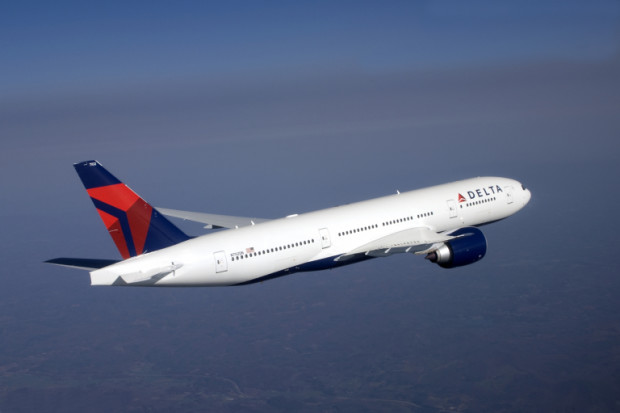
Delta Air Lines is one of the major U.S. carriers least likely to involuntarily bump passsengers, according to a report. Image: Delta Air Lines via AFP Relaxnews
Now that consumers have had their rude awakening about the grim reality of overbooked flights, it’s a good time to revisit a recently published study of the United States airlines most likely to bump confirmed passengers off their flight.
The biggest travel story of the week has undoubtedly been the incident of a passenger wrenched violently from his seat by aviation security officers on an overbooked United Airlines flight leaving Chicago O’Hare airport.
Videos capturing the incident show the man screaming in protest, hitting his head against the armrest across the aisle and being dragged out of the plane, while fellow passengers express their outrage.
But as we’ve learned in this incident, fliers tacitly agree to the risk of being involuntarily bumped as part of the “condition of carriage” agreement attached to their flight purchase.
Overbooking flights is a common practice in the airline industry to fill seats that go empty from missed connections and no-shows.
Recently, MileCards.com released a report highlighting the U.S. carriers where travelers are most and least likely to be bumped from their flight, be it voluntarily or involuntarily.
Airlines and their bump rates
According to MilesCard’s number crunching, Delta, Hawaiian and Virgin America are the U.S. airlines that are least likely to involuntarily bump confirmed passengers off their flight, at a rate of 0.1 out of every 10,000 passengers.
That figures spikes to 1 out of every 10,000 passengers on Southwest, which emerged the airline most likely to impose an involuntary bump.
Meanwhile, despite the amount of bad press overbooking has received, flexible fliers also stand to make a lot of money from the practice.
When a swath of storms swept through the U.S. East Coast last week, forcing the cancelation of more than 3,200 Delta Air Lines flights, one flier wrote about how she profited from the mayhem, pocketing $11,000 in gift cards when the airline needed volunteers to give up their seats on overbooked flights from New York to Florida.
Indeed, Delta emerged as the airline most likely to pay volunteers in the MilesCard report, with 10 out of every 10,000 passengers getting compensation for volunteering. That’s twice as high as American Airlines where the rate is 4.1 for every 10,000 passengers.
If you absolutely must get to your final destination and want to avoid the risk of being bumped and missing your flight at all, your best bets are JetBlue and Hawaiian, says MilesCard, which engage least in the practice of overbooking.
The overall risk of bumping is highest on regional flights and feeder airlines like ExpressJet and SkyWest, where the bump rate is 14.7 out of every 10,000 passengers.
The report also offers a few tips on how to avoid an involuntary bump that include checking in online early, particularly for Southwest so you get a lower boarding number, and getting to the gate on time.
Because if you don’t present yourself at the gate and you’re bumped, not only do you lose out on your flight but you’ve relinquished your right to compensation.
Check your boarding pass for the boarding time and be at the gate at least 30 minutes before departure for domestic flights. JB
RELATED STORY:
Online petition calls for resignation of United Airlines CEO

